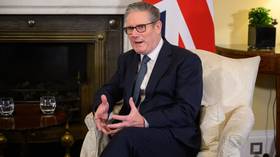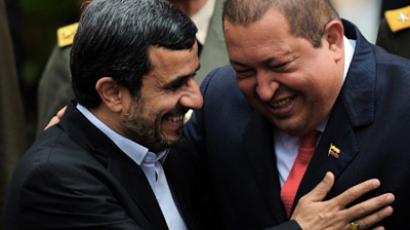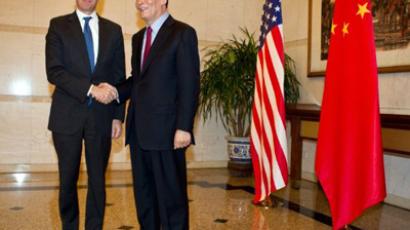US to occupy Persian Gulf? 'Iran is not a sitting duck!'
With US and UK warships gathering in the Persian Gulf and US troops deployed in Israel, tensions in the region keep rising. But a retired US Air Force Lieutenant Colonel explained to RT that Western powers are unlikely to invade Iran.
The Obama administration, through its secret channels, warned Iranian religious leader Ayatollah Khamenei that closing the Strait of Hormuz would be crossing a “red line” which will not be tolerated, New York Times reported on Thursday. According to the newspaper, the officials declined to disclose whether they had received any response from the Iranian side.Last week, the chairman of the Joint Chiefs of Staff, General Martin E. Dempsey, said that in case of the closure of the strait, through which 16 million barrels of oil pass every day, the United States will “take action and reopen the strait.” This would involve military means, including warship escorts, air strikes and minesweepers. On Thursday Defense Secretary Leon Panetta said that his country will not tolerate closure of the passage.Karen Kwiatkowski, a retired US Air Force Lieutenant Colonel, who worked in the Pentagon and the National Security Agency, believes the tensions are a part of a long-term provocation by the West against Iran.“In some way this is a continuation of a long, long, long provocation with that country. And certainly we work with Israel in doing that. When oil prices drop a little bit – stoke the fires.”Kwiatkowski believes the US has no serious intention of putting any ground troops in Iran because Iran is a much stronger country than Iraq and Afghanistan. “That would be an instant loss for the United States to do that,” she stated. “Iran is a very much different terrain. It has a very effective army. It can defend itself. Iran is not a sitting duck.”She predicts instead there will be a lot of rhetoric on both sides with continued low-level harassment.Kwiatkowski also claims that the tensions could be a part of a long-term trend to decrease US dependence on the oil that passes through the Strait of Hormuz.“In a more strategic sense the periodic threat of having the Strait of Hormuz limited or shut down for any short period of time in some way incentivizes these alternative routes for getting the oil to the world markets.” However, Lindsey German from the Stop the War Coalition, believes the sanctions and military pressure could indeed lead to absolutely devastating consequences. “The troop movements, the ships in the gulf, all of this points to more and more pressure on Iran, and even when people say nobody will be mad enough to start this war… people have said this before and there have been these wars. Sometimes they can start quite accidentally as a result of this kind of pressure,” German told RT.German believes the pressure is not justified and that the US and Israel are playing a very dangerous game.“It is absolutely well known that the only country in the Middle East with nuclear weapons is Israel, and yet Israel feels it has a justification for waging air strikes and possibly other forms of attack on a country it accuses of wanting to develop the same weapons that it [Israel] already has.”
Robert Naiman, policy director of US-based NGO Just Foreign Policy, says the Iranian threat is being overblown by American politicians – with even the highest officials silenced if they dare question it.“Defense Secretary Panetta was on Face the Nation on Sunday and [when he was asked] ‘Are they trying to build a nuclear weapon?’ [Panetta replied] ‘No.’ And the very next night PBS News Hour edited it out, that statement by Panetta, and used his remarks to try and argue the opposite,” he told RT. “This is part of the pattern in US media. Its certainly part of the pattern in the presidential campaign.”













